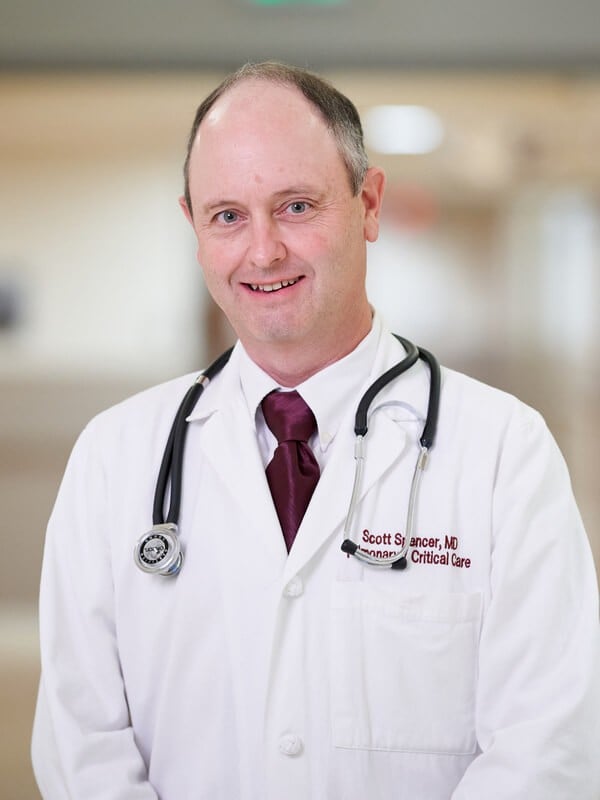Brazos Café
This café is located in the basement and does not accept cash. Hours include: Breakfast: 7:00am - 10:00am (weekdays); 8:00am - 10:00am (weekends) || Lunch: 11:00am - 2:00pm (everyday) || Self-service: 3:00pm - 8:00pm (weekends only)

The Intensive Care Unit (ICU) is a special section of the hospital equipped with advanced medical technologies and equipment, designed to care for critically ill or injured patients. Focused care is provided to patients in the ICU by a specialized healthcare team. Critical Care Unit (CCU) is often used interchangeably with ICU. Some ICUs are specialized to care for a certain population of patients. At St. Joseph Regional Health, we take care of a wide range of critical patients including Respiratory, Cardiac, Surgical, Trauma, and Neuro patients.
What to expect while in the ICU: Visitors to the ICU should prepare to see tubes, wires, machines, and monitors attached to the patient. Many of the machines and devices have alarms that sound periodically, which the staff are monitoring at bedside and at the nurses’ station.
We encourage family members of patients in the ICU to come visit us, but we ask that you please follow these guidelines:
Information for Visitors & Visitation Guidelines
About the Team
Meet the ICU Leadership Team
Meet the Intensivist Team
Every patient in the ICU is seen by an intensivist. The intensivist works closely with the attending physician and other specialists to establish an individualized plan of care for each patient in the intensive care unit. Our intensivist team is comprised of board-certified physicians who specialize in pulmonology and critical care medicine. The physicians are supported by physician assistants (PAs) and nurse practitioners (NPs) who specialize in critical care to ensure round the clock coverage and continuity of care.

Thomas Weber, MD, is dedicated to delivering high-quality, compassionate care to Bryan and nearby communities. Thomas Weber specializes in Pulmonary Medicine (Lung and Respiratory) and works at St. Joseph Health Pulmonology Associates.


Thomas Weber, MD, is dedicated to delivering high-quality, compassionate care to Bryan and nearby communities. Thomas Weber specializes in Pulmonary Medicine (Lung and Respiratory) and works at St. Joseph Health Pulmonology Associates.


Dr. Spencer is part of the St. Joseph Medical Group, a network of multidisciplinary healthcare providers conveniently located throughout the Greater Bryan and College Station areas.


Dr. Spencer is part of the St. Joseph Medical Group, a network of multidisciplinary healthcare providers conveniently located throughout the Greater Bryan and College Station areas.


Adnanul Karim, MD is part of St. Joseph Health Medical Group and St. Joseph and Texas A&M Health Network. St. Joseph Medical Group is comprised of more than 150 employed multidisciplinary physicians, specialists, and advanced practice clinicians conveniently located throughout the Brazos Valley.


Adnanul Karim, MD is part of St. Joseph Health Medical Group and St. Joseph and Texas A&M Health Network. St. Joseph Medical Group is comprised of more than 150 employed multidisciplinary physicians, specialists, and advanced practice clinicians conveniently located throughout the Brazos Valley.


Bino Joseph, MD, is dedicated to delivering high-quality, compassionate care to Bryan and nearby communities. Dr. Joseph specializes in Pulmonary Medicine and works at St. Joseph Health Pulmonology Associates.


Bino Joseph, MD, is dedicated to delivering high-quality, compassionate care to Bryan and nearby communities. Dr. Joseph specializes in Pulmonary Medicine and works at St. Joseph Health Pulmonology Associates.


Jeff Zuber, NP is part of St. Joseph Health Medical Group. St. Joseph Medical Group is comprised of more than 150 employed multidisciplinary physicians, specialists, and advanced practice clinicians conveniently located throughout the Brazos Valley.


Jeff Zuber, NP is part of St. Joseph Health Medical Group. St. Joseph Medical Group is comprised of more than 150 employed multidisciplinary physicians, specialists, and advanced practice clinicians conveniently located throughout the Brazos Valley.


Amy Ponzio, NP, is dedicated to delivering high-quality, compassionate care to Bryan and nearby communities. Amy Ponzio specializes in Trauma and works at St. Joseph Health Trauma.


Amy Ponzio, NP, is dedicated to delivering high-quality, compassionate care to Bryan and nearby communities. Amy Ponzio specializes in Trauma and works at St. Joseph Health Trauma.

Who are the members of the ICU patient care team?
Who else provides care and services to patients in the ICU?
The DAISY (Diseases Attacking the Immune SYstem) Award is an international recognition program that honors and celebrates the skillful, compassionate care nurses provide every day. The DAISY Foundation was established by the family of J. Patrick Barnes after he died from complications of an autoimmune disease in 1999. The family deeply appreciated the care and compassion shown them and to Mr. Barnes during his hospitalization. When he died, they felt compelled to say “thank you” to nurses in a very public way by creating the DAISY Award recognition program.
St. Joseph Health is proud to partner with the DAISY Foundation in its goal to recognize the extraordinary work that nurses do everyday. Share your story of how a St. Joseph nurse has made a difference to you.
STAR Program
When any St. Joseph Health team member goes “above and beyond” in your care or service, we encourage you to help us recognize these individuals.
You may fill out a Compliment Card, found at any one of our nurses’ stations, and place it in the Compliment Box at the ICU entrance. You may also leave us a message online.
Concerns or complaints
Providing high quality care is the ultimate goal of the healthcare team at St. Joseph Health. ICU stays can be highly stressful; if there is a concern that arises during the hospital visit, please be sure to first communicate with your nurse and/or physician so that the issue can be addressed as soon as possible. If you need further assistance, please ask to speak with the Team Leader, who can assist in resolving, or escalating if necessary. Our leadership team is always available and will ensure any issues are addressed to the best of our ability and with the patient’s safety and well-being as the main priorities. We sincerely appreciate concerns being brought to our attention and providing us an opportunity to respond.
This café is located in the basement and does not accept cash. Hours include: Breakfast: 7:00am - 10:00am (weekdays); 8:00am - 10:00am (weekends) || Lunch: 11:00am - 2:00pm (everyday) || Self-service: 3:00pm - 8:00pm (weekends only)
This dining option is located on the 1st floor and does not accept cash. Hours include: Weekdays: 6:00am - 8:00pm || Closed on the weekend
Our vending machines take cash or cards. They are located throughout the hospital: Basement by Brazos Café entrance || 1st floor, Tower Lobby || 2nd floor, between ICU and Telemetry || 3rd floor, next to Visitor Central Elevators || 4th floor, Family Waiting Area
ICU Delirium
What is ICU delirium?
Delirium refers to severe confusion where the patient cannot think clearly, has difficulty paying attention, does not understand what is going on as they typically would, and may see or hear things that are not there. This can be frightening. Many ICU patients experience delirium. It is caused by changes in how the brain works. Some of the reasons this happens in the ICU is because of decreased oxygen, illness, chemical change in the brain, medication, infection, severe pain, anesthesia, and alcohol withdrawal.
Signs and symptoms of ICU delirium
Delirium comes on quickly, in hours or days. Signs of delirium can change from one day to the next. Delirium can make memory and thinking problems worse. Delirium usually clears up after a few days or even a week.
Prevention strategies for ICU delirium
If your patient is having signs of delirium, you may be asked to sit with them.
Post-Intensive Care Syndrome (PICS) Dana
What is PICS?
Advances in medicine allows us to treat the sickest patients with success, but often patients who have been treated for a serious illness in the intensive care unit have some symptoms that do not go away after they are home. These symptoms can not be completely avoided.
Signs and symptoms of PICS
Some symptoms affect the body. ICU acquired weakness is muscle weakness developed during an ICU stay. This makes getting back to normal daily activities difficult and frustrating. Some symptoms affect the mind. Brain dysfunction, also known as cognitive dysfunction, is when the person has difficulty remembering, paying attention, solving problems, and/or organizing complex tasks. Some can have other mental health problems. This can include nightmares or unwanted memories, depression, difficulty sleeping, strong feelings or emotions, depression, and anxiety. These can be symptoms of posttraumatic stress disorder.
PICS for Families
After a family has had an ICU stay and the family has been asked to make overwhelming decisions, they also can experience mental health symptoms such as anxiety, depression, and posttraumatic stress disorder. It is very important that the family of an ICU patient takes care of themself. Their needs are just as important as the patient’s needs. It is important to eat well, rest, exercise, call on assistance whether from family and friends or from the hospital to assist with resources such as case management and spiritual care
ICU Diary
A diary of the time the patient spent in the ICU can be valuable in helping the patient understand their critical experience. They may have memory gaps, partial memories, hallucinations, and nightmares from the time that they were sedated and/or intubated in the ICU. A diary written by family, friends, and healthcare staff about what is happening both in the hospital and at home for the patient to read after discharge to fill gaps in memory. This helps them understand what happened in the ICU and while they were away from home. ICU diaries can reduce the risk of developing Post Traumatic Stress Disorder for the patients and families.
Common Medications in the ICU
Looking for a doctor? Perform a quick search by name or browse by specialty.